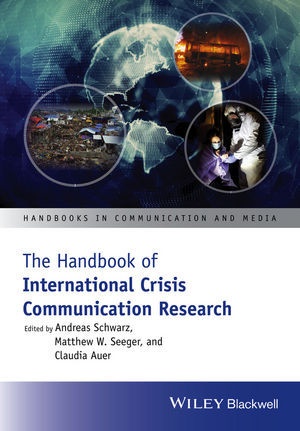Read more
Informationen zum Autor Andreas Schwarz is Senior Lecturer and Managing Chair of the Department of Media Studies at Ilmenau University of Technology in Germany. He is also managing director of the International Research Group on Crisis Communication and the founding chair of the Temporary Working Group on Crisis Communication at the European Communication Research and Education Association (ECREA). Matthew Seeger is Dean of the College of Fine Arts, Performing and Communication Arts and Professor of Communication at Wayne State University, USA. His influential research in crisis communication scholarship had led to over 100 journal articles, contributions and co-authoring six books on crisis communication and organizational communication ethics. Claudia Auer is Research Assistant at the Institute of Media and Communication Science of the Ilmenau University of Technology, Germany. She is a member of the International Research Group on Crisis Communication and the Ilmenau Center of Public Diplomacy Research and Training. Klappentext The Handbook of International Crisis Communication Research articulates a broader understanding of crisis communication, discussing the theoretical, methodological, and practical implications of domestic and transnational crises, featuring the work of global scholars from a range of sub-disciplines and related fields.* Provides the first integrative international perspective on crisis communication* Articulates a broader understanding of crisis communication, which includes work from scholars in journalism, public relations, audience research, psychology, political science, sociology, economics, anthropology, and international communication* Explores the topic from cross-national and cross-cultural crisis communication approaches* Includes research and scholars from countries around the world and representing all regions* Discusses a broad range of crisis types, such as war, terrorism, natural disasters, pandemia, and organizational crises Zusammenfassung The Handbook of International Crisis Communication Research articulates a broader understanding of crisis communication, discussing the theoretical, methodological, and practical implications of domestic and transnational crises, featuring the work of global scholars from a range of sub-disciplines and related fields. Inhaltsverzeichnis Notes on Contributors ix Introduction: Searching for an Integrative Approach to International Crisis Communication Research 1. Significance and Structure of International Risk and Crisis Communication Research: Toward an Integrative Approach 1 Andreas Schwarz, Matthew W. Seeger, and Claudia Auer Part I Disciplinary Foundations for International Crisis Communication Research 11 Political Science 2. Political Science Research on Crises and Crisis Communications 13 Saundra K. Schneider and Marty P. Jordan Management and Economics 3. Delving into the Roots of Crises: The Genealogy of Surprise 24 Christophe Roux¿Dufort Psychology 4. The Psychology of Crisis Communication 34 M. Brooke Rogers and Julia M. Pearce Sociology 5. Sociological Foundations of Crisis Communication 45 Martin Voss and Daniel F. Lorenz Anthropology 6. "Crisis" in Social Anthropology: Rethinking a Missing Concept 56 Stefan Beck and Michi Knecht Communication: Toward an Integrative Approach 7. Communication - Conclusions for an Integrative Approach to International Crisis Communication Research 66 Claudia Auer, Andreas Schwarz, and Matthew W. Seeger Part II Actors and Institutional Communicators in International Crises 73 War 8. Military, Government, and Media Management in Wartime 75 Kathrin Sch...
List of contents
Notes on Contributors ix
Introduction: Searching for an Integrative Approach to International Crisis Communication Research
1. Significance and Structure of International Risk and Crisis Communication Research: Toward an Integrative Approach 1
Andreas Schwarz, Matthew W. Seeger, and Claudia Auer
Part I Disciplinary Foundations for International Crisis Communication Research 11
Political Science
2. Political Science Research on Crises and Crisis Communications 13
Saundra K. Schneider and Marty P. Jordan
Management and Economics
3. Delving into the Roots of Crises: The Genealogy of Surprise 24
Christophe Roux-Dufort
Psychology
4. The Psychology of Crisis Communication 34
M. Brooke Rogers and Julia M. Pearce
Sociology
5. Sociological Foundations of Crisis Communication 45
Martin Voss and Daniel F. Lorenz
Anthropology
6. "Crisis" in Social Anthropology: Rethinking a Missing Concept 56
Stefan Beck and Michi Knecht
Communication: Toward an Integrative Approach
7. Communication - Conclusions for an Integrative Approach to International Crisis Communication Research 66
Claudia Auer, Andreas Schwarz, and Matthew W. Seeger
Part II Actors and Institutional Communicators in International Crises 73
War
8. Military, Government, and Media Management in Wartime 75
Kathrin Schleicher
Terrorism
9. Crisis Communication and Terrorist Attacks 85
Owen Hargie and Pauline Irving
Natural Disasters/Pandemia
10. Communication Concerning Disasters and Pandemics: Coproducing Community Resilience and Crisis Response 96
Jenni Hyvärinen and Marita Vos
Organizational Crisis
11. International Organizational Crisis Communication: A Simple Rules Approach to Managing Crisis Complexity 108
Robert R. Ulmer and Andrew S. Pyle
Political Crisis
12. Conceptualizing Political Crisis and the Role of Public Diplomacy in Crisis Communication Research 119
Claudia Auer
Part III The Role of the Media in the Construction of International Crises 133
War
13. The Role of the Media in the Discursive Construction of Wars 135
Stig Arne Nohrstedt
Terrorism
14. Terrorism and the Role of the Media 145
Liane Rothenberger
Natural Disasters/Pandemia
15. Media Framing of Disasters: Implications for Disaster Response Communicators 155
J. Suzanne Horsley
Organizational Crisis
16. Organizational Crisis and the News Media 165
Mario Schranz and Mark Eisenegger
Political Crisis
17. Political, Social, and Economic Crises in Public Communication 175
Kurt Imhof
Part IV Domestic and International Audiences in the Context of Crisis Communication 189
War
18. War, Media, and Public Opinion: A Battle for Hearts and Minds 191
Michel M. Haigh
Terrorism
19. Terrorism - Orchestrated Staging and Indicator of Crisis 200
Wolfgang Frindte, Daniel Geschke, and Sebastian Wagner
Natural Disasters/Pandemia
20. Reoccurring Challenges and Emerging Threats: Crises and the New Millennium 212
Patric R. Spence and Kenneth A. Lachlan
Organizational Crisis
21. Domestic and International Audiences of Organizational Crisis Communication: State of the Art and Implications for Cross-Cultural Crisis Communication 224
An-Sofie Claeys and Andreas Schwarz
Political Crisis
22. Environmental Crises and the Public: Media Audiences in the Context of Environmental and Natural Threats and Disasters 236
Jens Wolling
Part V The State of Crisis Commu

